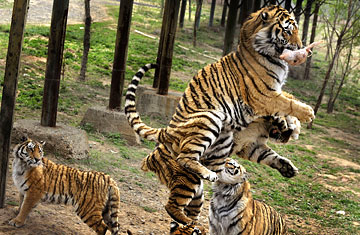
Tigers jump for a chicken tossed by a feeder on May 7, 2009, at a branch of the Harbin Siberian Tigers Breeding Center in northeast China's Heilongjiang province
It is an irony not lost on the Chinese public that the Year of the Tiger has not been good for the big cats. On Tuesday, state media reported that dozens of tigers and other endangered animals had died of malnutrition over the past two years at the Northern Forest Zoo in the Chinese city of Harbin. Workers, who later leaked the story to the media, buried their bodies in a 3-meter pit to hide the animals from authorities.
The report follows the news in March that 11 rare Siberian tigers had starved to death within a few months at the Shenyang Forest Wild Animal Zoo in northeast China. The cases have shed light on the murky world of China's 12 tiger farms, which were initially set up by the state in the 1980s to preserve the numbers of animals in existence. They have also underscored changing attitudes toward animal rights in a country where exotic animals have often been treasured less for their rarity and more for their medicinal or culinary benefits.
Traditional Chinese medical theories have long extolled the health benefits of tonics and poultices made from rare animal parts, including everything from bear bile to deer antlers. Among enthusiasts for this esoteric branch of traditional medicine, few animals are more treasured for their nutritive qualities than the tiger. Tiger bone wine — a rice alcohol brewed in a vat with the carcass of one of the cats — is prized as a tonic for fatigue and sexual potency, for example. In an effort to clamp down on the lucrative poaching industry that sprung up around the big cats, sales of tiger parts were banned in 1993.
But that edict closed off the primary revenue stream for the dozen tiger farms nationwide. The Guilin Xiongsen Tigers and Bears Mountain Village in southern Yunnan province had 400 tigers when the sales ban was enacted. In hopes the ban would be temporary, the farm continued breeding and now has 1,500 tigers. Each tiger costs roughly $9 per day to feed, which equates to nearly $5 million a year in costs for the park. The revenue the village receives from visitors is far less than that. Some facilities have turned to unusual schemes to generate extra income. At the Harbin Siberian Tiger Park, visitors can pay about $6 to buy a live chicken tied to a stick, which they then dangle over the side of a tiger pen, watching as the animals tear it to pieces. A menu of sorts is available for tourists to choose from: about $120 gets you a live cow, which is then released into the pen with the tigers, with predictable consequences.
At the Shenyang and Harbin parks, however, budgets were apparently strained to such an extent that animals simply weren't fed for weeks at a time. The dire financial straits and gross neglect at the Shenyang site came to light only when disgruntled workers — who hadn't been paid for months — contacted the media.
The Chinese government has come under increasing pressure from owners of tiger farms to relax the ban on trading tiger parts. So far the government has resisted those efforts, a move that seems to be in keeping with shifting public sentiment. The back-to-back tiger tragedies have been followed closely in China, spurring calls for greater legal protections for animals. Meanwhile, lawmakers have been drafting the country's first regulations on animal abuse. The government is considering, among other things, a ban on the consumption of dog and cat meat, a culinary specialty in southern China. Under the proposed law, companies or restaurants that sell cat or dog meat could face fines of up to $73,000.
"Harming animals hurts the spirit of the people, especially the younger generation," says Chang Jiwen, a professor of law at the Chinese Academy of the Social Sciences and one of the key drivers of the legislation. "A ban on abusing animals generally would illustrate that China has reached a new level of civilization."
